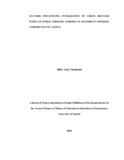| dc.description.abstract | The purpose of the study was to investigate the factors influencing integration of
urban refugee pupils in public primary schools in Dagoretti division Nairobi
County, Kenya. It sought to determine whether language of instruction,
government policy, social factors and economic factors influence integration of
urban refugee pupils in public primary schools. The study was based on the
theories of integration adopted by Saggar (1995). It adopted a descriptive survey
design and target 12 public schools, thus 12 head teacher, 240 teacher and 450
class 6,7 and 8 pupils. Simple random sampling was used to select half of the
schools, 20% of pupils and 10% of teachers comprising of 6 public schools,
where by 6 head teachers, 24 teachers and 90 pupils were used. Questionnaire
tools were adopted to collect the data from respondents. The study findings
revealed that majority of the schools use both English and Kiswahili as school
communication languages and class instruction languages. However, urban
refugee pupils who mainly come from non-English speaking countries are
hindered from primary education due to these language barriers. Therefore
teachers need to offer remedial lessons on language to urban refugee pupils who
are lagging behind. The government enacts both Children’s Act 2001 on
children’s rights to education and FPE policy since both policies advocate for
education for all children without discrimination. Hence admission into primary
education of urban refugee pupils should be without discrimination to promote
their integration. Government needs to come up with better ways of admitting
refugee pupils into schools since during flee they were not in a position to carry
their identification documents. Refugee pupils’ social status succumbs to
discrimination and hostility from schools, teachers and host pupils. Thus, they
either abuse back, fight or withdraw and traumatized since they have not
recovered from the psychological trauma faced earlier in life hindering
integration. Refugee parents’ are poor and cannot afford their children’s basic
needs let alone their educational needs like textbooks and uniforms. These hinder
refugee pupils are from enrolling and when enrolled they are not retained in
school. The government should come up with strategies to provide schools
resources and uniforms to refugee pupils. The researcher therefore suggests that;
A study to be carried out on the influence of instructional language on the
performance of refugee pupils in public primary schools | en_US |

